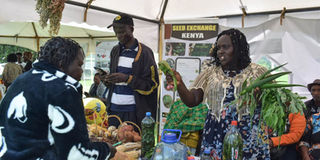Meet the climate-smart farmers of Nakuru, who are using cheap alternative fertilisers instead of synthetic ones

Martha Njenga from Gilgil, takes a farmer though some of the local alternatives she can use as a bio-pesticide.
With growing concerns about synthetic pesticides and fertilisers, not to mention the current quality of the former, farmers in Nakuru have opted for safer alternatives that are also environmentally friendly.
They are doing this by adopting the use of biopesticides and biofertilisers, a move aimed at promoting sustainable and resilient agriculture.
The inappropriate use of synthetic pesticides and fertilisers has been linked to soil degradation, threatening food safety and biodiversity (i.e. they can kill non-target plants, insects and animals), pollution of water resources, among others.
Biopesticides and biofertilisers are more natural products designed to biologically control crop pests and diseases and promote plant growth by improving nutrient uptake.
Martha Njenga, a farmer in Gilgil, has adopted organic farming. She says she has been an organic farmer for more than ten years, since she saw the benefits of organic farming through the quality of her harvests and how at the same time she is able to protect the environment.
In the ten years she has been farming, she has never bought fertiliser or pesticides from an Agrovet shop. Instead, she mixes natural plants to make a concoction that she then uses on her three-acre farm.
"I have been farming for more than ten years and not once have I bought synthetic pesticides and fertilisers - I use natural products. For example, I mix a bunch of herbs like aloe vera, mwarubaini, cactus and spring onion. I then ferment them for seven to 21 days. I then use the mixture in a ratio of 1 litre of bio-pesticide to 20 litres of water in my spray pump to spray my farm," says Ms Njenga.
This is a cheaper and healthier alternative that helps her keep pests and diseases away from her crops.
"Plants like dhania and Mexican marigold (mubangi) have a pungent smell that acts as natural repellent and you only need to keep a few of them in your farm to control pests. So there is no need to buy synthetic pesticides because they are naturally available," she said.
"I can also compost waste from my farm and home to make organic fertiliser to improve my soil structure and organic matter, which in turn improves my yields. I urge everyone to embrace and make this transition to help us grow healthy food, save on production costs and protect our biodiversity," she concluded.
Speaking during the bio-pesticide and bio-fertiliser exhibition, Nakuru county Agriculture Chief Officer, Newton Mwaura, said he hoped organic farming would gain popularity in the county, noting that the county was looking to meet the international market's demand for organic produce.
"When we look at the international market where Nakuru is a big exporter, we see that there is a new demand for organic produce and that is the market we are trying to capture and the good thing is that farmers have ready solutions," said Mr Mwaura.
